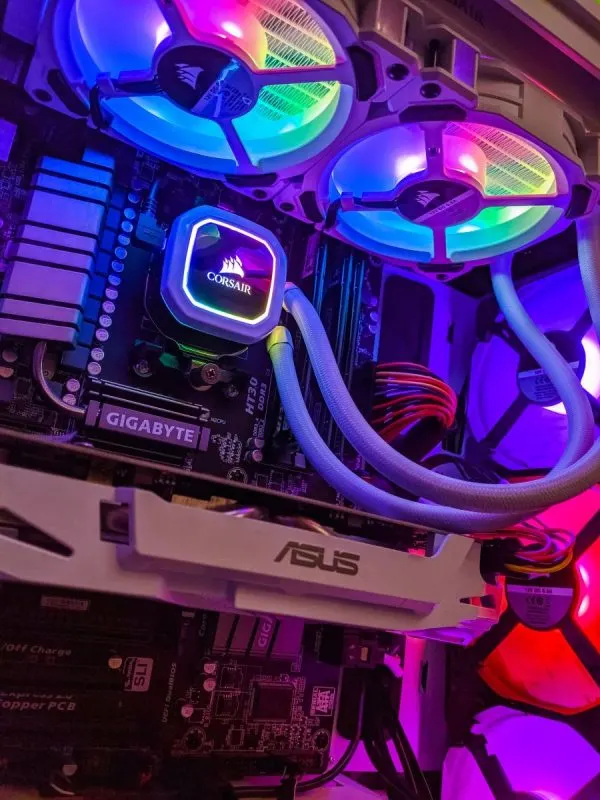When you are looking to cool your CPU, what type of cooling do you choose? Liquid cooling or air cooling?
Liquid cooling is a more advanced and expensive option for those who want the best performance out of their CPU. Air-cooling is cheaper but less efficient than liquid-cooling but good enough in specific situations.
The decision between these two types of coolers really depends on what kind of user you are and how much money that you want to spend on a new system setup.
In this article, we will compare both types of cooling and help you decide which one suits your needs better.
We’ll start by checking out the Pros and Cons of both liquid cooling and air cooling before comparing these two methods and finding out which one should you choose.
Liquid Cooling vs Air Cooling: PROs and CONs analyzed
Liquid Cooling: Pros
– Liquid cooling setups are usually more efficient than air cooling ones, which means that you’ll be able to overclock your CPU more with less noise coming from the fans.
– Liquid-cooled CPUs require no maintenance and will last for years without any problems, as long as there is water in the system. This makes it a very long-lasting cooling solution.
– Since liquid cooling is more efficient at keeping temperatures low, it will increase your device’s performance and life span, also keeping all programs running smoothly.
Liquid Cooling: Cons
– Liquid-cooled CPUs are expensive, with a single cooler costing hundreds of dollars and requiring you to shell out another few hundred bucks for the rest of the components needed to make it work properly (like tubing or pumps).
– Liquid cooling setups usually require users to have good knowledge about how to assemble water cooling systems.
– Liquid-cooled CPUs are complicated and require you to have a lot of spare space inside your case, which can be problematic if it’s already full with other components that need good air circulation to work properly.
Air Cooling: Pros
– Air coolers are cheaper than liquid cooling setups, with the most expensive air cooler only costing a little over $100, but many coming with much friendlier pricing.
– Air coolers usually require no maintenance or assembly, as they come pre-assembled. Even if they not, installing them is very easy even for those who are not too tech-savvy.
– Air cooling setups are still pretty silent and will not give you any problems regarding overheating if your computer case has good airflow (meaning that it’s well ventilated) and you don’t run very resource-intensive programs.
Air Cooling: Cons
– Since they don’t have any advanced features like water cooling systems, air coolers are usually less efficient than Liquid-cooled CPUs, especially when you run more demanding programs (such as games)
– Air cooling setups create more noise when the fans are cranked up to their maximum speeds to dissipate as much heat as possible from inside your case. They can also get noisier over time as dust accumulates on the fan.
– Since they don’t have any advanced features like water cooling systems, air cooler need regular maintenance to keep working properly (you need to clean them regularly in order to avoid dust accumulation).
– Air cooling setups are not the best option when it comes to overclocking your CPU.
Which one should you choose? Liquid cooling or air cooling?
Liquid cooling wins hands down when it comes to performance but isn’t cheap at all while air cooling is cheaper than liquid cooling but isn’t as efficient.

If money isn’t an issue for you, then Liquid Cooling is the best option that you have when it comes to keeping your CPU cool and performing better while overclocking it.
However, if you are on a budget, a traditional air cooler will work well enough to keep your computer or laptop running as it should, as long as you don’t throw at it very resource-demanding programs for longer periods of time.
Also, when using the traditional air cooling method, overclocking is not recommended.
However, even though liquid cooling is the most efficient way to keep the temperatures low, it’s not really a must for the more casual users.
As long as you are not playing next-generation games, running video editing software at high resolution, and generally stay away from very demanding programs, air cooling should be good enough for your setup.
Do you have to refill liquid cooling setups?
No, you don’t have to refill Liquid cooling setups. These are sealed units that only require the tubes to be filled with fluid once after installation and do not need any additional maintenance or refills.
However, if there is a leak in your Liquid-cooled CPU’s tubing system, then it will stop working since air will mix with the coolant, which will make it evaporate.
In this case, you will have to drain everything and refill your Liquid-cooled CPU setup again before using it or risk damaging other components in your computer.
Is Liquid cooling hard to maintain?
No, Liquid cooling is not hard to maintain. You only need to keep an eye on the system and refill it if necessary, but this is generally not required and accidents like the liquid spilling are very rare.
Do you need liquid cooling if you play computer games?

No, liquid cooling is not necessary if you play computer games.
As long as the air around your case has enough airflow and it’s well ventilated to keep all of its components cool, a traditional air cooler should work fine in keeping your CPU running at normal temperatures.
However, Liquid-cooled CPUs are perfect for those who play the latest and most demanding computer games as well as other resource-demanding applications that put a lot of stress on the processor.
This is because Liquid cooling can keep your CPU running at much lower temperatures than traditional air coolers, allowing you to overclock it more without worrying about overheating problems.
Conclusion
Liquid cooling is the best option when it comes to keeping your CPU cool and performing well, even if you overclock it. It’s also more efficient than traditional air cooling setups and doesn’t create too much noise or dust problems like regular fans do.
However, Liquid-cooled CPUs are expensive and require maintenance every once in a while to keep them running properly, which is why more casual users should stick with traditional air cooling.
What are your thoughts on the matter though? Would you consider liquid cooling a must or air cooling is just enough for you?

